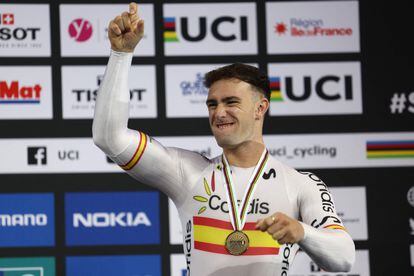Martínez Chorro, on the podium, with his bronze medal.THOMAS SAMSON (AFP)
Bad beasts do four laps at full throttle, at the Saint Quentin velodrome in Yvelines, the
banlieu
of Paris.
What an exhibition of gluteus maximus, of vastus, of the muscles that produce the force that generates speed, what tears those of Alejandro Martínez Chorro, who degreases on the roller stuck in the
pelousse.
It is the final of the kilometer against the clock (stop start) of the Track Cycling World Championship.
Martínez Chorro, Alicante from Sant Vicent del Raspeig, 24 years old, 1.82m, 90 kilos, “and I am a cyclist, not a bodybuilder, although people think so because of my muscles”, he clarifies, the first of the eight came out who dispute it.
In theory, this is how it should finish, eighth, since the start is organized in reverse order to the times of the morning classification.
But something happens.
He has secured himself well, with an additional strap, the shoes on the pedals and has done something unexpected.
He has done the best kilometer of his life, the best, in fact, of any Spaniard in history.
He has completed the four laps of the soft Siberian pine track in less than a minute (59.871s), at more than 60 kilometers per hour (and with a maximum speed of 70 kilometers per hour at two-thirds of the way), a record that until recently only the very good and high ones were achieved, such as losing four minutes in pursuit, the grail, and observe, as if it were an unbearable suspense movie, "and only tears came to my eyes while I watched it", he specifies, how, one after another, renowned sprinters, gods of buttocks, vast, straight, hamstrings, twins of steel, crash against their mark without being able to overcome it.
They come to thousandths, to hundredths,
and there they stay.
The New Zealander Kergozou and the Canadian Hedgcock collide.
The Japanese Obara collides and even the German Dornbach collides.
There are three left to go.
The medal is approaching and, next to Martínez Chorro, the president of the federation, José Luis López Cerrón, and the coach Félix García Casas, nervously bounce, his first World Cup at the head of the Spanish track.
Martínez Chorro, during her kilometer.ANNE-CHRISTINE POUJOULAT (AFP)
The French colossus Melvin Landerneau surpasses him, one of the favorites, surpasses him, but only by 303 thousandths, and his hopes increase seeing the catastrophic exit of the penultimate rival, the Italian Bianchi, who finishes over a minute.
He is already a medal.
He is bronze.
And he knows that it is so because only a miracle would prevent the Dutchman Jeffrey Hoogland, the king of the specialty, from bursting the clock.
He does it with the greatest of facilities.
He wins with 58.106s, more than a second less than any of his rivals, at an average of 61.926 kilometers per hour, and, in his fast madness, he reaches close to 80.
By then, defeated by emotion, the sprinter from Alicante, the first Spaniard to win a medal in track speed events for three decades, since the days of José Manuel Moreno, world champion in 1991 and Olympic champion in 1992, also of the kilometer, a specialty that no longer figures in the Olympic program.
"For Paris 24 I want to prepare well for keirin, the test that suits me best after the kilometer, because the pure speed test, the individual sprint (200 meters thrown) falls short for me," says Martínez Chorro by phone.
“It would be amazing if I were to succeed again at this velodrome in two years, but I'm only 24. I don't know if my Games will be Paris or Los Angeles.
I have to keep growing and there is time.
And now I want to enjoy the moment.
Whatever happens,
At his side speaks García Casas, previously coach of the Spanish Paralympic cycling team on all surfaces.
The cyclist from Alicante tells how the cyclist trains at the Valencia velodrome with Jaume Barber and it is so hard that he even went to train in Cottbus, the German speed factory, the city of Lutz Hesslich, the sacred monster of speed in East Germany in the 1980s, four-time world champion and two-time Olympic champion in velodromes.
“And I was there for a year and I learned a lot”, says the sprinter from Alicante, who thinks, at this moment, only of his people, his parents, his family, his partner, in all those who have suffered at his side all the last months of work, covid included, that have led him to arrive at Saint Quentin at his best.
“And everyone has suffered with me.
You can follow EL PAÍS Deportes on
and
, or sign up here to receive
our weekly newsletter
.

